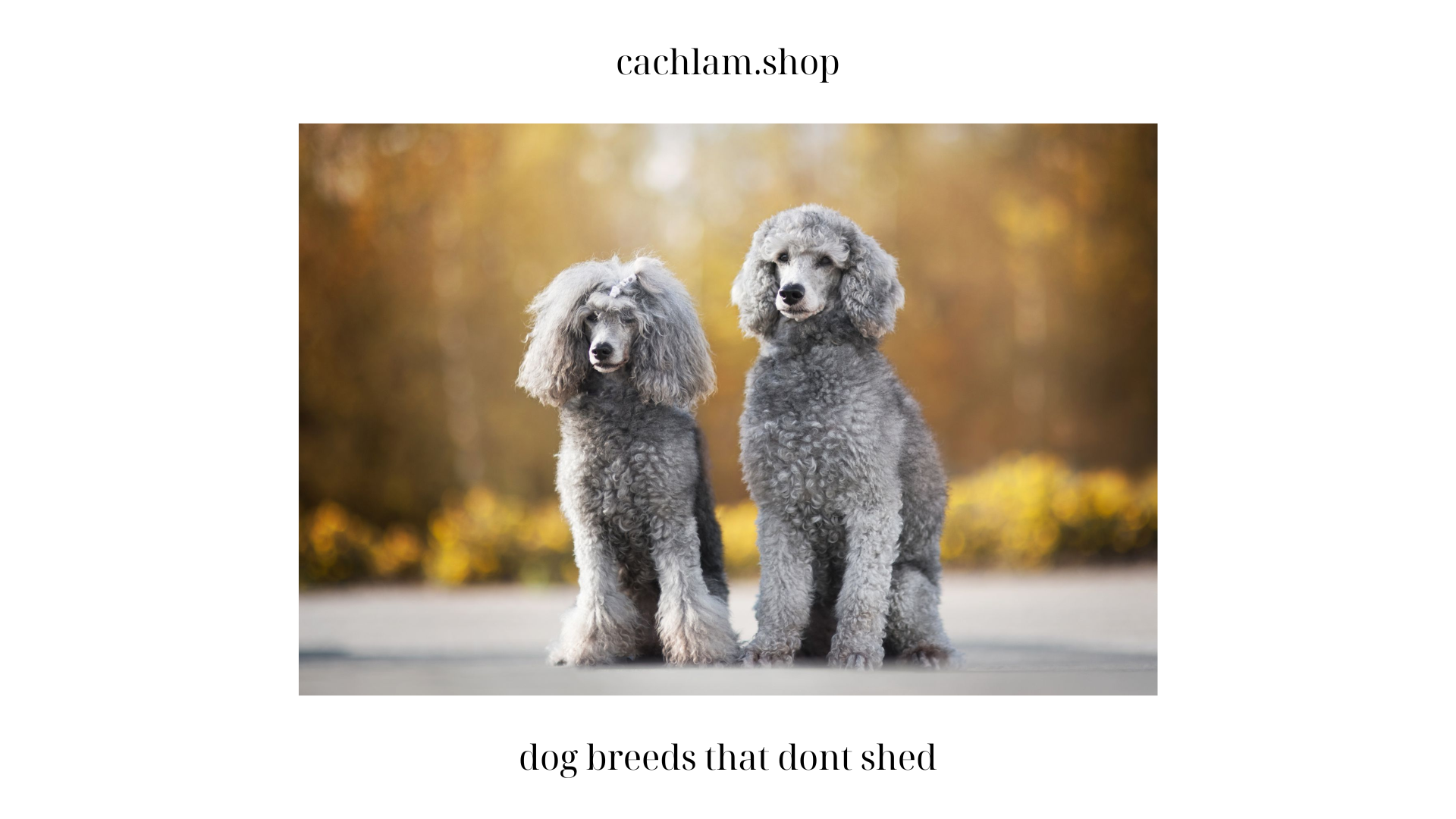For individuals who suffer from allergies or simply prefer a cleaner living environment, owning a dog that doesn’t shed can be a perfect solution. Shedding can lead to excessive fur on furniture, allergies triggered by dander, and constant cleaning. In this comprehensive guide, cachlam will delve into the world of dog breeds that dont shed. From hypoallergenic traits to grooming requirements and temperament, this article will provide valuable insights to help you choose the ideal dog breeds that dont shed that fits your lifestyle.
Exploring Dog Breeds That Dont Shed: A Comprehensive Guide

Owning a non-shedding dog breed can be a wonderful choice for individuals with allergies or those seeking a low-maintenance pet. By understanding the characteristics, grooming requirements, and temperaments of different non-shedding breeds, youcan make an informed decision that aligns with your lifestyle and preferences.
Whether you choose a Poodle, Bichon Frise, Maltese, or any other non-shedding breed, these dogs can bring joy, companionship, and minimal shedding into your life. Remember to consider factors such as allergies, grooming needs, and compatibility with your living situation when selecting the perfect non-shedding dog breed for you. With the right choice, you can enjoy the benefits of having a furry friend without the constant struggle of cleaning up shedding fur.
Understanding Non-Shedding Dog Breeds:
- Importance of dog breeds that dont shed:
- Explain the significance of dog breeds that dont shed for individuals with allergies or those seeking a low-maintenance pet.
- Highlight the benefits of having a dog that doesn’t shed, such as reduced allergens, less cleaning, and a more comfortable living environment.
- Hypoallergenic Dog Breeds:
- Define hypoallergenic dog breeds that dont shed and their unique characteristics.
- Clarify that while no dog breed is completely hypoallergenic, some breeds produce fewer allergens, making them suitable for individuals with allergies.
- Non-Shedding vs. Low-Shedding Breeds:
- Differentiate between dog breeds that dont shed that dont shed and low-shedding dog breeds.
- Explain that non-shedding breeds typically have hair instead of fur, which grows continuously and requires regular grooming.
Exploring dog breeds that dont shed:
![Top 10 Small Dogs That Don't Shed or Smell [ Perfect for Families ] Updated 2022 - YouTube](https://i.ytimg.com/vi/q0Spzroru3g/maxresdefault.jpg)
- Poodle:
- Discuss the Poodle breed, known for its hypoallergenic coat and minimal shedding.
- Highlight the breed’s intelligence, versatility, and various sizes (Standard, Miniature, and Toy).
- Bichon Frise:
- Provide an overview of the Bichon Frise, a small, non-shedding breed with a curly, hypoallergenic coat.
- Emphasize the breed’s affectionate nature, playfulness, and suitability for families.
- Maltese:
- Explore the Maltese breed, which has a long, silky, and dog breeds that dont shed coat.
- Discuss the breed’s small size, gentle temperament, and its suitability for apartment living.
- Portuguese Water Dog:
- Discuss the Portuguese Water Dog, known for its dog breeds that dont shed, waterproof coat.
- Highlight the breed’s intelligence, athleticism, and historical role as a working dog.
- Yorkshire Terrier:
- Highlight the Yorkshire Terrier breed, which has a silky, non-shedding coat.
- Discuss the breed’s small size, lively personality, and adaptability to different living environments.
- Shih Tzu:
- Explore the Shih Tzu breed, known for its long, flowing, non-shedding coat.
- Discuss the breed’s friendly disposition, loyalty, and its popularity as a companion dog.
- Schnauzer:
- Discuss the Schnauzer breed, specifically the Miniature Schnauzer, which has a wiry, non-shedding coat.
- Highlight the breed’s intelligence, trainability, and its suitability for families and individuals with allergies.
- Afghan Hound:
- Explore the Afghan Hound breed, known for its dog breeds that dont shed, flowing, non-shedding coat.
- Discuss the breed’s elegance, independent nature, and its grooming requirements.
- Chinese Crested:
- Highlight the Chinese Crested breed, which comes in two varieties: hairless and powderpuff (with a non-shedding coat).
- Discuss the breed’s affectionate nature, adaptability, and its suitability for individuals with allergies.
- Basenji:
- Discuss the Basenji breed, which has a short, easy-to-maintain coat that does not shed excessively.
- Highlight the breed’s intelligence, independence, and its unique vocalization, known as the “baroos.”

Selecting the Right Non-Shedding Breed:
- Consideration of Lifestyle:
- Emphasize the importance of selecting a dog breeds that dont shed that matches your lifestyle, including factors such as activity level, space availability, and family dynamics.
- Allergy Considerations:
- Discuss the significance of consulting with an allergist or spending time with the desired breed to ensure compatibility with allergies.
- Highlight the importance of managing allergens through regular grooming and maintaining a clean living environment.
- Grooming Requirements:
- Explain the grooming needs associated with non-shedding breeds, including regular brushing, haircuts, and professional grooming.
- Discuss the time, effort, and cost required to maintain the coat of a non-shedding breed.
Conclusion:
Owning dog breeds that dont shed can be a wonderful choice for individuals with allergies or those seeking a low-maintenance pet. By understanding the characteristics, grooming requirements, and temperaments of different non-shedding breeds, youcan make an informed decision that aligns with your lifestyle and preferences.
Whether you choose a Poodle, Bichon Frise, Maltese, or any other non-shedding breed, these dogs can bring joy, companionship, and minimal shedding into your life. Remember to consider factors such as allergies, grooming needs, and compatibility with your living situation when selecting the perfect non-shedding dog breed for you. With the right choice, you can enjoy the benefits of having a furry friend without the constant struggle of cleaning up shedding fur.
